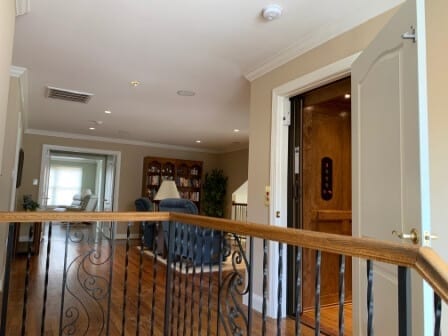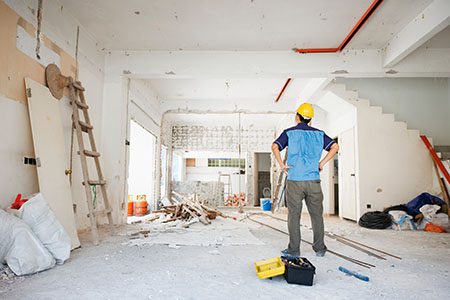“Can I build my own elevator?” is a question we hear quite often at Symmetry Elevators. After all, DIY home elevator kits are available on the market. You can find YouTube tutorials for almost anything, so why not indulge your inner handyperson and install an in-home elevator yourself?
DIY home elevators are, unfortunately, not a good idea. We’ve already discussed why home elevator kits are not do-it-yourself in the past. Here we’ll go into a little more detail about why you should never use a DIY elevator kit.
1. Personal Safety during and after Installation
Safety is paramount when installing a residential elevator. The process requires a thorough understanding of electricity, construction, building codes, machinery, and renovation techniques — a complex group of specialized skills that most homeowners don’t possess. Remember that the very nature of elevator installation requires work performed at multiple levels of your home. Without proper training and equipment, you could hurt yourself. We say this not to be alarmist, but it’s the truth. Installation tasks that are second-nature to trained elevator installers can lead to injuries when performed by untrained DIYers. This is as true for installing a small home elevator as it is for larger models.
Post-installation safety is also an issue. You want assurances that your residential elevator will provide reliable, safe operation. Unless you’re an experienced installation expert, there’s too much risk of incorrectly installing DIY home elevator kits, leading to potentially unsafe situations in the future.
How Reliable are Home Elevators?
When installed professionally, home elevators are safe and reliable due to carefully thought-out building codes and regulations. Professional elevator installers have a comprehensive knowledge of national and local elevator codes and ensure your new elevator meets all safety requirements.
2. Quality of Materials
DIY home elevator kits are often made of lower quality materials than professionally installed elevators. Lesser material quality means a shorter lifespan. Machine and electronic parts will require more repairs, which may prove costly, especially as a DIY home elevator kit’s warranty will be limited, if a warranty even covers the kit.
Your elevator’s appearance can be adversely affected by lower-quality materials. The elevator cab, buttons, lighting, doors, and accessories will deteriorate faster due to daily wear and tear, necessitating costly replacements. Choosing a higher-quality, professionally installed home elevator may be more expensive over the short term, but its reliability and durability will save money over time.
3. Multiple Professionals are Needed for Proper Elevator Installation
You can’t just buy a DIY home elevator and simply install it. Architects and engineers are needed to determine the appropriate location and structural requirements for proper elevator installation. Licensed contractors are needed for installation, and once complete, a building code inspector checks the elevator to ensure all regulations are properly met. If you choose to act as your own elevator installer, you need to arrange architectural and engineering evaluations yourself, and then arrange a visit from a certified inspector. Not taking these steps could become a serious problem if you choose to sell your property and the elevator is not up to code.
4. Insuring DIY Home Elevators Can be Impossible
Home insurers want assurances residential elevators are correctly installed and maintained. The presence of an in-home elevator DIY kit sets off alarm bells with many insurers, who may charge you higher than average premiums, or worse, opt not to insure your home at all.
5. You’re on Your Own
Perhaps the main issue with DIY home elevators — even when considering a small home elevator — is the lack of support. If something goes wrong, it’s on you to fix the problem. Elevator technicians will be very leery about maintaining and repairing DIY units because the jobs are more complicated and due to the potential liability of servicing any elevator not professionally installed.
Instead, you’re much better off working with a professional elevator installer. You’ll have the peace of mind that comes from knowing your home elevator was properly installed and have access to an experienced technician for maintenance, ensuring years of worry-free operation.
Find out more about the benefits of professional elevator installation by contacting your local Symmetry Home Elevator dealer today.


